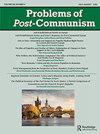为什么是气候?后苏联时代东欧邻国欧盟气候治理的驱动因素
IF 2
2区 社会学
Q2 POLITICAL SCIENCE
引用次数: 6
摘要
摘要欧盟将自己定位为全球气候领导者。欧盟参与外部气候治理的情况在东欧六个后苏联国家最为明显。这篇文章询问是什么推动了欧盟参与该地区的气候治理。为了回答这个问题,我区分了外部气候行动的三种逻辑:利己主义、功能性和文明化。通过分析欧盟与六国之间的气候合作,我证明了这三种逻辑的结合解释了欧盟参与外部气候治理,但功能逻辑比其他两种略为突出。本文章由计算机程序翻译,如有差异,请以英文原文为准。
Why Climate? The Drivers of the European Union’s Climate Governance in its Post-Soviet East European Neighbors
ABSTRACT The European Union (EU) has positioned itself as a global climate leader. The EU’s engagement with external climate governance is most visible in the six post-Soviet states of Eastern Europe. This article asks what drives the EU’s engagement with climate governance in the region. To answer this question, I distinguish between three logics of external climate action: self-interest, functional, and civilizing. By analyzing climate cooperation between the EU and the six states, I demonstrate that a combination of all three logics explains the EU’s engagement in external climate governance, but that the functional logic is slightly more prominent than the other two.
求助全文
通过发布文献求助,成功后即可免费获取论文全文。
去求助
来源期刊

Problems of Post-Communism
POLITICAL SCIENCE-
CiteScore
4.00
自引率
12.50%
发文量
33
期刊介绍:
The post-communist countries are the most rapidly changing societies of Europe and Asia. For insight into this twenty-first century revolution, there is no better source than Problems of Post-Communism. Emphasis is placed on timely research covering current economic, political, security, and international developments and trends in Russia and China, Central Europe and Central Asia, Latin America, and Southeast Asia. Clarity and readability make the articles fully accessible to researchers, policy makers, and students alike.
 求助内容:
求助内容: 应助结果提醒方式:
应助结果提醒方式:


